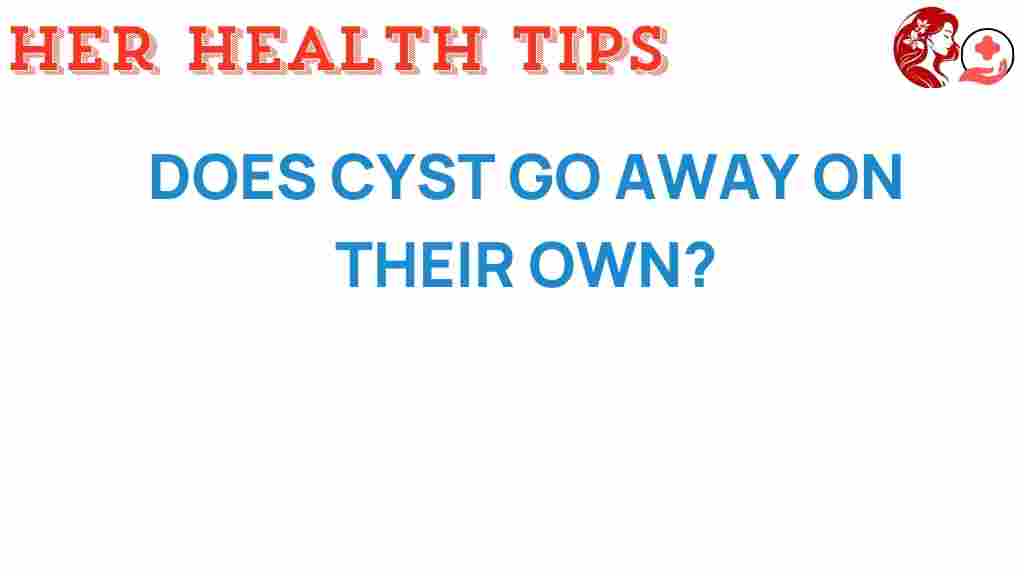The Mysteries of Cysts: Do They Really Disappear on Their Own?
Cysts are fluid-filled sacs that can develop in various parts of the body. They can range in size from tiny to large and can occur due to a variety of reasons, including infections, blockages in ducts, or even genetic conditions. While many people experience cysts at some point in their lives, the question remains: do cysts really disappear on their own? In this article, we will explore the mysteries surrounding cysts, focusing on their self-resolution, symptoms, treatment options, and prevention strategies to promote overall health and wellness.
Understanding Cysts
Before diving into whether cysts can self-resolve, it’s important to understand what they are and how they form. Cysts can occur almost anywhere in the body, including:
- Skin (epidermoid cysts)
- Breasts (breast cysts)
- Ovaries (ovarian cysts)
- Kidneys (renal cysts)
- Liver (liver cysts)
Each type of cyst has different causes, potential symptoms, and implications for health. Some cysts are completely harmless, while others may require medical attention.
Do Cysts Disappear on Their Own?
The concept of self-resolution in cysts is a topic of significant interest in the medical community. Many cysts, especially those that are small and asymptomatic, may resolve on their own without any medical intervention. Here are some insights into the self-resolution of cysts:
- Size Matters: Small cysts, particularly those that are less than a centimeter in diameter, are more likely to disappear on their own. Larger cysts, however, may persist and require treatment.
- Type of Cyst: Certain types of cysts, such as sebaceous cysts, may rupture and heal naturally, while others, like ovarian cysts, can vary in behavior depending on hormonal cycles.
- Body’s Healing Mechanism: The body’s immune system may sometimes target and resolve simple cysts, leading to their disappearance.
It’s crucial to note that not all cysts will self-resolve. If you experience symptoms or if the cyst increases in size, it’s important to seek medical advice.
Symptoms Associated with Cysts
The symptoms of cysts can vary widely depending on their location and size. Below are common symptoms that may indicate the presence of a cyst:
- Swelling: A noticeable lump or bump on the skin or in the tissue.
- Pain or Discomfort: Some cysts can be painful, especially if they are inflamed or infected.
- Changes in Skin Color: Redness or discoloration may occur if a cyst is infected.
- Fluid Drainage: In some cases, cysts may rupture, leading to fluid drainage.
- Menstrual Irregularities: In the case of ovarian cysts, symptoms may include changes in menstrual cycles.
Being aware of these symptoms is essential for early detection and treatment, if necessary.
Treatment Options for Cysts
When cysts do not disappear on their own, several treatment options are available. The choice of treatment largely depends on the type of cyst, its location, and whether it is causing symptoms. Here are some common treatment methods:
- Observation: If the cyst is small and asymptomatic, a doctor may recommend simply monitoring it over time.
- Medications: Anti-inflammatory medications or antibiotics may be prescribed if the cyst is infected.
- Drainage: For larger or painful cysts, a healthcare provider may perform a drainage procedure to relieve pressure and discomfort.
- Surgery: In some cases, surgical removal of the cyst may be necessary, particularly for larger cysts or those that pose a risk of complications.
It’s important to consult with a healthcare professional for an accurate diagnosis and appropriate treatment plan tailored to individual needs.
Preventing Cysts: Health and Wellness Strategies
While not all cysts can be prevented, there are several health and wellness strategies that can reduce the risk of developing them:
- Maintain Good Hygiene: Regularly cleansing the skin can help prevent blockages in hair follicles and glands.
- Healthy Diet: A balanced diet rich in fruits, vegetables, and whole grains may support overall health and reduce the risk of cyst formation.
- Hydration: Drinking plenty of water helps maintain healthy skin and may prevent cysts from forming.
- Regular Check-Ups: Routine medical check-ups can help detect any abnormalities early, ensuring prompt treatment if necessary.
- Manage Hormonal Changes: For women, understanding hormonal fluctuations and their effects on cyst formation—especially ovarian cysts—can be beneficial.
By adopting these preventive measures, individuals can support their overall health and potentially minimize the occurrence of cysts.
Troubleshooting Tips for Cysts
If you are dealing with cysts, here are some troubleshooting tips to consider:
- Monitor Changes: Keep track of any changes in size, shape, or symptoms associated with the cyst.
- Avoid Squeezing: Do not attempt to squeeze or pop a cyst, as this can lead to infection or inflammation.
- Seek Professional Advice: If a cyst becomes painful or shows signs of infection (redness, warmth, or drainage), consult a healthcare provider promptly.
- Ask About Imaging: If necessary, your doctor may recommend imaging tests (like an ultrasound) to assess the cyst’s nature and determine the best course of action.
These tips can help you manage cysts effectively and reduce the risk of complications.
Conclusion
The mysteries surrounding cysts, their potential for self-resolution, and the associated health implications are complex. While many cysts can disappear on their own, it is crucial to monitor symptoms and seek medical advice when necessary. Understanding the nature of cysts, recognizing their symptoms, and exploring treatment and prevention options empower individuals to take charge of their health and wellness.
For more information on cysts and related conditions, consider visiting this resource. Consulting with healthcare professionals can provide personalized insights and guidance for managing cysts effectively.
Stay informed, prioritize your health, and be proactive in seeking knowledge about cysts and their management!
This article is in the category Conditions and created by HerHealthTips Team
